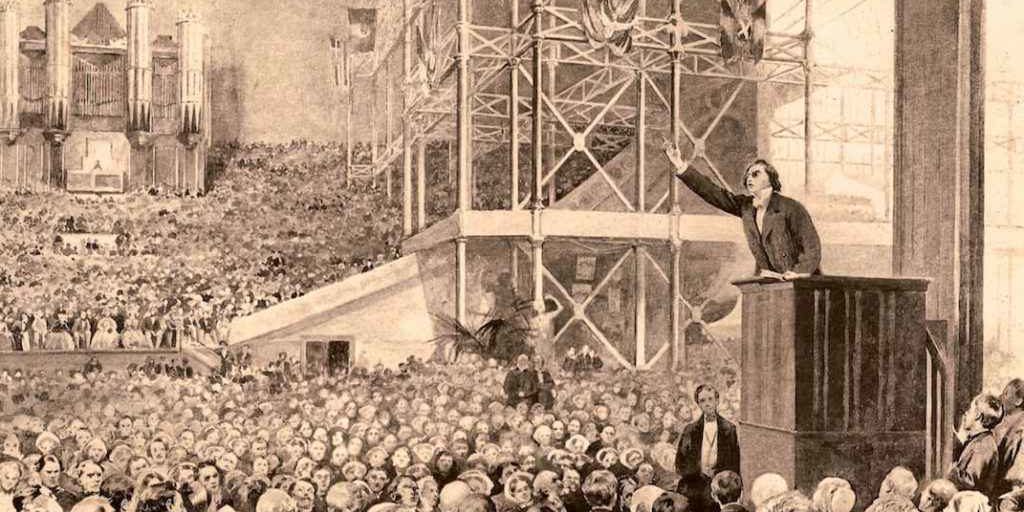
Spiritual Sight as an Act of Divine Creation: Charles Spurgeon on 2 Corinthians 4:5–6
Charles Spurgeon (1834-1892), long regarded as the most renowned Baptist pastor and widely acknowledged as the “Prince of Preachers,” hovered over the Victorian era as its most popular minister. A distinctive in Spurgeon’s ministry was his preaching of God as sovereign in salvation. He knew from Scripture and experience that a Christian’s salvation was due wholly to God. In his sermons on 2 Corinthians 4:5–6, Spurgeon articulated the supernaturalness of salvation in Christ.
2 Corinthians 4:4c-5
For what we proclaim is not ourselves, but Jesus Christ as Lord, with ourselves as your servants for Jesus’ sake.
For Spurgeon, the means by which the light of the gospel of the glory of Christ would break in was preaching. Sandwiched between the blindness of unbelievers in verses 3–4 and the awakening light that God shines through the gospel in verse 6, Paul writes in 2 Corinthians 4:5, “For what we proclaim is not ourselves, but Jesus Christ as Lord.” “What are the means of salvation?” Spurgeon asked. He responded in this way: “Why, first and foremost stands the preaching of the Word of God! More men are brought to Christ by preaching than by anything else—for it is God’s chief and first instrument.”[1] Whatever the other tasks of the Christian minister might be, the main task was “to publish to the sinners the glad tidings that there is a Savior.”[2] Spurgeon spoke to ministers with a clear call in mind, “It is your business to preach the gospel to dead sinners, for it is the gospel that makes the dead to live!”[3] It has been said that in reading Spurgeon’s sermons, one will not find a single occurrence where he does not preach Christ in the gospel of grace. Preaching Christ, “who is the image of God” (v. 4), was to occupy the ministry of every herald, for “Christ is the author of the gospel, the subject of the gospel and the end of the gospel.”[4]
Spurgeon believed that the power of the gospel was such that he hoped, even while he was preaching, the light of the gospel of the glory of Christ might overcome the blindness of sinners and awaken them to saving faith: “I pray that while I am speaking of the light of the gospel of the glory of Christ that light may penetrate their minds. May God who commanded the light to shine out of darkness speak again the almighty fiat, saying, ‘Let there be light.’”[5] He prayed elsewhere, “O heavenly light, shine now into the soul of all who hear or read this sermon!”[6] Spurgeon knew from his own conversion that salvation was not bound up in the eloquence of the messenger, but in the right articulation of the saving message. The message of the gospel in the Word of God was the surgical instrument in the hands of the Holy Spirit that brought about new life in Christ.[7] Therefore, exposure to the Word of God for Spurgeon was vitally important. He wrote of the importance of it in this way: If the Word of God “shines around them, it may bring them eyes. God the Holy Spirit blessing it, light will beget sight.”[8] In the same sermon, Spurgeon again said, “I wish I could induce unbelievers here to read the story of the crucifixion every morning and to keep on reading it and studying it; for I am persuaded that the light which streams from the cross would, by the blessing of God, open their eyes, and enter their souls savingly.”[9]
2 Corinthians 4:6
For God, who said, “Let light shine out of darkness,” has shone in our hearts to give the light of the knowledge of the glory of God in the face of Jesus Christ.
Building upon the depravity of man (v. 3), the blinding work of Satan (v. 4), and the proclamation of the gospel (v. 5), Paul climaxes the section of Scripture (2 Corinthians 4:3–6) by remarking on the re-creative act of God, whereby He shines “the light of the knowledge of the glory of God in the face of Jesus Christ” into the hearts of unbelievers and thus beams light to “shine out of darkness” (v. 6). Spurgeon interprets verse six as “a parallel between the Spirit’s work in the old and new creation.”[10] He observes, “The work of the Holy Spirit in the soul of man is comparable to His work in creation. In the great book of nature, we see traces of the same hand as in the book of grace! And in this great picture of material beauty, we may see the handiwork of that same master artist who has drawn lines and curves of spiritual beauty upon the souls of the redeemed! As the movement of the Holy Spirit upon the waters was the first act in the six days work, so the work of the Holy Spirit in the soul is the first work of grace in that soul.”[11]
Echoes of Genesis 1 are rightly heard in 2 Corinthians 4 according to Spurgeon. He commented, “To open the eyes of blind souls is an act of creation. The act of creating a soul anew is as much a work of God’s Omnipotence as the making of a world!”[12] Just as “the earth was without form and void and darkness was upon the face of the deep” (Gen. 1:2), the human soul is smothered by the darkness of its own depravity. Man contributes nothing to the re-creative work of God and, in this way, God mirrors His first creative act by recreating His people “ex nihilo,” out of nothing. For in “the dead sinner there is nothing that can help his own resurrection.”[13] Spurgeon saw unregenerate people as completely incapable of initiating or contributing to the resurrection work that needed to take place in their hearts. This truth led him to depend wholly on the Holy Spirit and prayer in the conversion of sinners.
It is that truth which also leads us to say with Spurgeon, “I cannot understand the reason why I am saved, except upon the ground that God would have it so.”
[1] Charles H. Spurgeon, The New Park Street Pulpit, Vol. 5 (Pasadena, TX: Pilgrim Publications, 1991), 210.
[2] Spurgeon, The Metropolitan Tabernacle Pulpit, Vol. 58, 61.
[3] Spurgeon, The Metropolitan Tabernacle Pulpit, Vol. 55, 113.
[4] Spurgeon, The Metropolitan Tabernacle Pulpit, Vol. 35, 171.
[6] Ibid., 176.
[7] Charles H. Spurgeon, The Metropolitan Tabernacle Pulpit, Vol. 50 (Pasadena, TX: Pilgrim Publications, 1978), 74.
[8] Spurgeon, The Metropolitan Tabernacle Pulpit, Vol. 35, 180.
[10] Spurgeon, The Metropolitan Tabernacle Pulpit, Vol. 55, 110.
[12] Spurgeon, The Metropolitan Tabernacle Pulpit, Vol. 54, 534.
[13] Spurgeon, The Metropolitan Tabernacle Pulpit, Vol. 58, 111.

